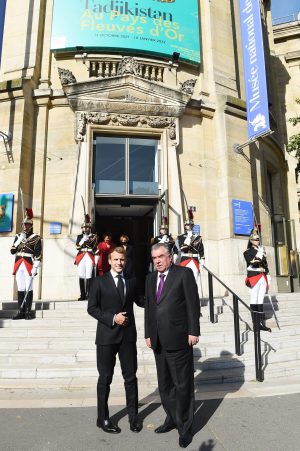Last week, Tajik President Emomali Rahmon visited Europe. With stops in Brussels to meet with European Union leaders and a state visit to France, Rahmon has parlayed his firm public position against the Taliban into continued engagement with Europe.
On October 11, Rahmon met in Brussels with European Council President Charles Michel. In a tweet, Michel said: “The #EU is committed to cooperating with Tajikistan on post-COVID19 recovery, the spill-over of the situation in Afghanistan and climate change.” He also stated: “We underlined the need for an inclusive government in Afghanistan.”
On October 13, Rahmon was welcomed to Paris by French President Emmanuel Macron. Macron had invited Rahmon to visit following a late August phone call, which was arguably triggered by the rapid pace of events in Afghanistan. While Macron highlighted the opening of an archaeological exhibit at the Guimet Museum devoted to Tajikistan (which he and Rahmon opened together) as marking the visit, the motivation remained pressing policy concerns related to Afghanistan.
In a statement after welcoming Rahmon but before settling into talks, Macron said the two would focus on “bilateral relations and the situation in Central Asia.”
Macron also referred to their earlier phone call in noting that “Tajikistan has a long border with Afghanistan and shares a large number of concerns with France.” He characterized the visit as an opportunity to strengthen dialogue on regional security “in this period of uncertainty” and said the two leaders would take stock of the “assistance that France can bring to stabilize the situation and the useful contribution that we can make to the entire region.”
Rahmon visited France back in 2019, again at the invitation of Macron. That visit was his first to France since 2002. Human Rights Watch at the time urged Macron to “be true to his principles and publicly call out President Rahmon for his brutal policies.”
Rahmon has been in power since 1994, making him one of the world’s longest serving leaders. An autocrat with dynastic ambitions, he’s eliminated all serious opposition from the country and appears to be positioning his son to take over in the future. But if human rights activists had hoped in 2019 that Macron would urge Rahmon to moderate, that did not happen. And now, the events of August 2021 have derailed not only Afghan democracy but any hope for Western governments to pressure Rahmon.
Tajikistan’s position vis-a-vis the Taliban aligns more closely with the position of European capitals, and even the United States, than the other states of the region or even other global powers like China and Russia. This, as I’ve written previously, gives Rahmon a moment in the spotlight to re-cast himself as a useful partner, no matter his autocratic means.
Tajikistan, in contrast with its Central Asian neighbors, has remained firm in not directly engaging with the Taliban.
Since the Taliban’s takeover of Afghanistan in mid-August and the subsequent full withdrawal of U.S. and NATO forces, the wider Central Asian region has had to recalibrate their policies toward Afghanistan to fit the new reality. Broadly this has meant tepid urging for an “inclusive” Afghan government, followed by acknowledgement (though not formal recognition) and engagement with the existing all-Taliban government.
This was perhaps easiest for Uzbekistan, which has engaged the Taliban in recent years within the confines of promoting a peace process, and Turkmenistan, which has also engaged the Taliban more directly in recent years (and did so during the Taliban’s earlier tenure in power in the 1990s). Those already-established channels of communication came in handy. But even Kazakhstan and Kyrgyzstan have adjusted their efforts, despite fewer pre-existing contacts with the Taliban: In late September, Kyrgyzstan dispatched a delegation to meet with Taliban officials in Kabul and Kazakhstan’s ambassador in Afghanistan met with Taliban officials.
Tajikistan, meanwhile, has traded verbal barbs with the Taliban, prompting both Russia and Pakistan to urge the two sides to turn down the heat earlier this month. The Taliban’s frustration with Tajikistan is most clearly linked to the country’s welcoming of the would-be Afghan resistance, as led by Ahmad Massoud. Last week, RFE/RL reported that Massoud had “briefly visited” Dushanbe for talks with Taliban representatives in early October — sponsored by Tajikistan and Pakistan — but the Taliban didn’t show up. Massoud, Tajik officials told RFE/RL, returned to Afghanistan afterward. It’s not clear where Massoud is now.
With no regional options for truly “like-minded” partners, France at least seems to be settling on Tajikistan. How useful the relationship will be in addressing France, or Europe’s, concerns in Afghanistan is to be seen. Tajikistan has carved out for itself a unique position which does not (yet) exclude any of its partners, but if there is an acute crisis Dushanbe may not be able to satisfy all those same partners at the same time.
This week, following Rahmon’s return to Tajikistan, the country is hosting military exercises with the Russia-led Collective Security Treaty Organization (CSTO) near the Afghan border.
































